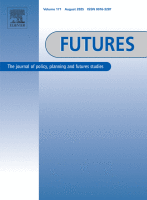Scenario planning can become a useful framework for dealing with uncertain contexts in urban transportation planning. However, academic literature has contested its outcomes due to the difficulties in exploring changing actors’ interactions underlying resulting scenarios. To address this issue, an archetype-based process for building urban transport scenarios was implemented to explore the representation of diverse collaboration forms within scenario narratives. Collaborative planning and scenario-building literature provided key dimensions of social capital for building collaboration archetypes out of the analysis of 158 scenario narratives, using natural language processing techniques. The use of proposed archetypes as input for a two-round Delphi-based process enabled experts to evaluate and contextualize them as part of the content of future scenarios of urban transport systems in Spanish mid-size cities. The main results enabled the researchers to synthesize the experts’ inputs and reactions in four long-term scenarios: Integrated Smart City, City of Good Intentions, Expansive Hypermobility, and Proximity Transition. These scenarios describe diverse collaboration forms (technology-driven, conservative, conventional, adaptive and localist) in the local and sectoral contexts. The obtained results highlight and discuss the potential of representing forms of collaboration within scenarios to facilitate an effective integration of strategic scenario-building into planning processes.

